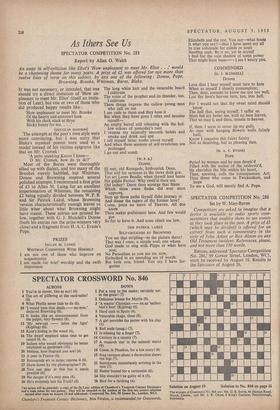As Ithers See Us
An essay in self-criticism like Eliot's 'How unpleasant to meet Mr. Eliot . . would be a chastening theme for many poets. A prize of was offered for not more than twelve lines of verse on this subject, by any one of the following : Donne, Pope, Browning, Brooke, Whitman, Burns, Blake.
IT was not necessary, or intended, that one should try a direct imitation of 'How un- pleasant to meet Mr. Eliot' (itself an imita- tion of Lear), but one or two of those who did produced happy results like :
'How unpleasant to meet Mr. Brooke Of the hearty and extrovert look With his clock stuck at three Sticky honey for tea. . .
(DOUGLAS HAWSON)
The attempts at the poet's own style were more convincing, but I was sorry that Blake's mystical poems were used as a model instead of his vicious epigrams like that on Mr. Cromek :
'A petty sneaking Knave I knew- 0 Mr. Cromek, how do ye do?'
Most of the Burns were thoroughly silted up with dialect, and too many of the Brookes merely babbled, but Whitman, Donne and Browning inspired several polished attempts. I recommend a first prize of £3 to Allan M. Laing for an excellent impersonation of Whitman, the remaining £2 being equally divided between W. P. B. and Sir Patrick Laird, whose Browning version characteristically enough leaves us little wiser about what Browning might have meant. These entries are printed be- low, together with G. J. Blundell's Donne (both his entries ran the prize-winners very close) and a fragment from H. A. C. Evans's Pope.
PRIZES
(ALLAN M. LAINO) WHITMAN COMMUNES WITH HIMSELF
I am not one of those who improve on acquaintance I am made for brief worship and the swift impression
The long white hair and the venerable beard I cultivate The voice of the prophet and its thunder, too, I cultivate These things impress the callow young men who call on me I am rude to them and they love it But when they have gone 1 relax and become
myself—
An empty barrel still vibrating with the hol- low echoes of yesterday's rant I resume my naturally uncouth habits and smoke and drink and spit I tell myself bitter truths about myself And when these sessions of self-revelation are prolonged
I go out and vomit.
(W. P. B.) DONNE
Ill met, old Renegade, hydroptick Dean, That still for sermons to the stews doth goe, Yet art Loves Beadle, when thyself hast beene His giddie Paritor. Why swell'st thou soe, Old lecher? Durst thou scourge that Sinne Which thine owne fleshe did ever most approve, Stop up those paths thyself didst journey in And douse the tapers of thy former love? Come, prate no more of Heaven. All doe know Thou seekst preferment here. And few would goe
So far to have it. And none climb soe low.
(SIR PATRICK LAIRD) SELF-CRITICISM BY BROWNING
You see that stripling—in the picture there? That was I once; a simple soul, one whom God made to sing with Pippa or what have you; No Paracelsus as you see me now, Embathed in an unending sea of words.
But look you, friend. You say I have for- gotten
Elizabeth and the rest. You say—what boots It what you say?—that I have spent my all In true solicitude for minds or souls
Needing such. Be it so; yet in myself
I find but the vain shadow of some power That might have been— I see I weary you.
COMMENDED
(G. J. BLUNDELL) DONNE
Love that I bear myself must turn to hate When as myself I closely contemplate; Then, dear, consent to know me not too well, Lest thy love's heaven turn, too, into hell.
For I would not that thy sweet mind should know
The hell that, seeing myself, I suffer so. Meet but my better me, with no base leaven, That so may I, and thou, remain in heaven.
If, then, I seem to cover up my guilt.
As men with hanging flowers walls falsely built, Know I conceive this fairer falsity Not as deceiving, but as pleasing thee.
(H. A. C. EVANS) POPE
Petted by women and by men despis'd Filled with the malice of the undersiz'd, He cherishes the bile within his heart, Then, spewing, calls the consequences, Art;
Thus those who come to Twickenham, and
hope To see a God, will merely find A. Pope.


































 Previous page
Previous page